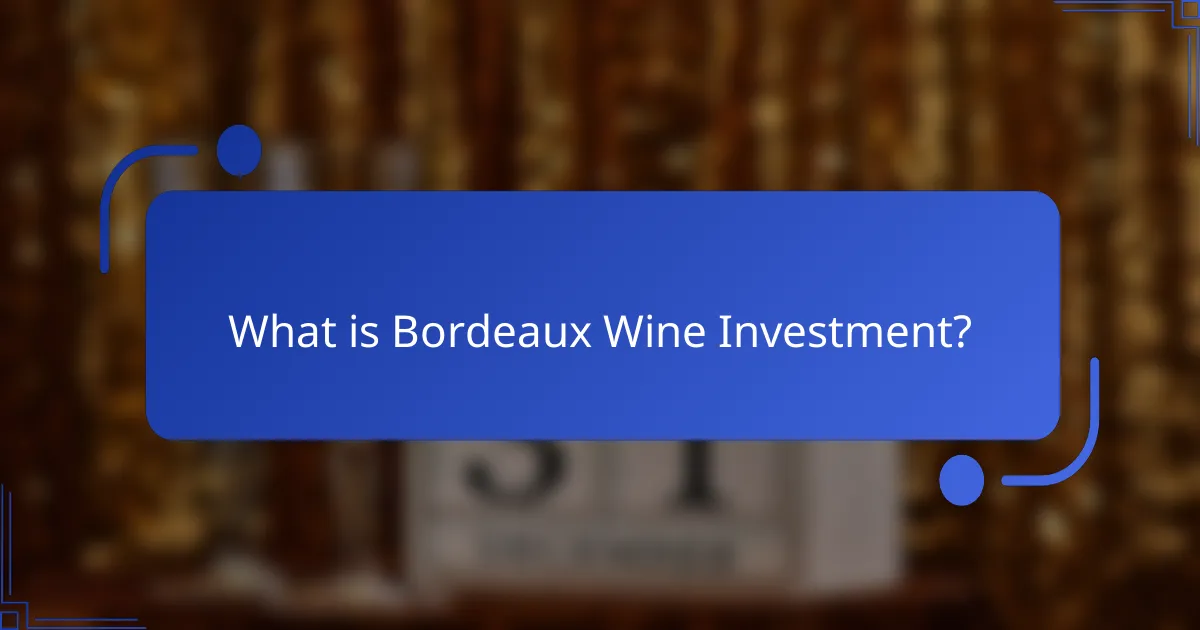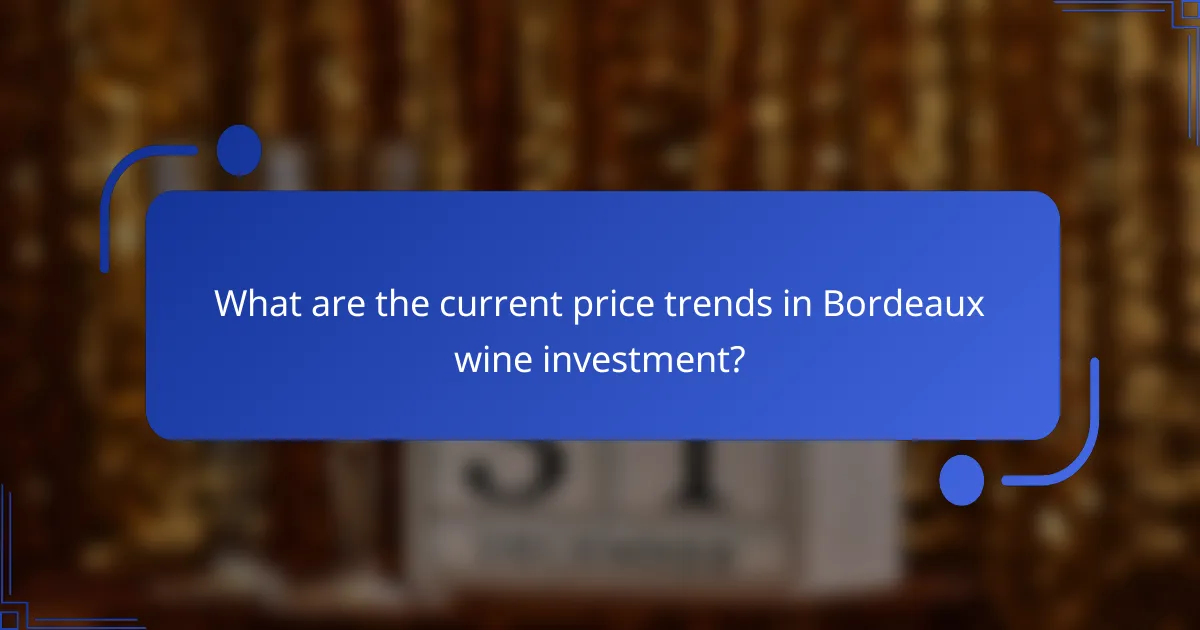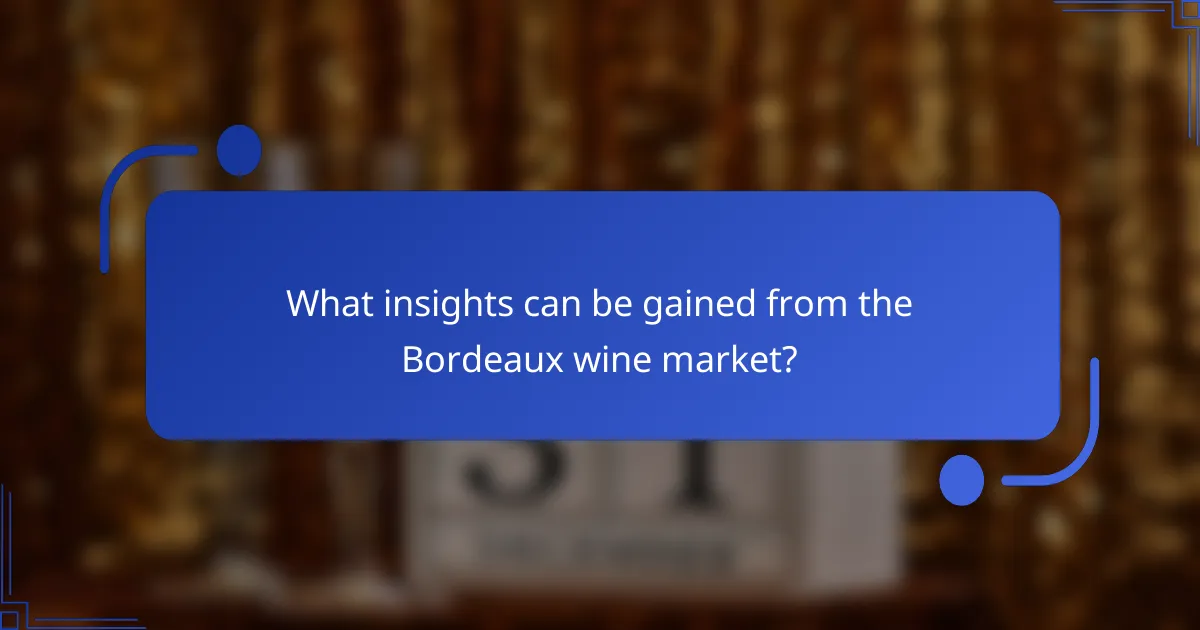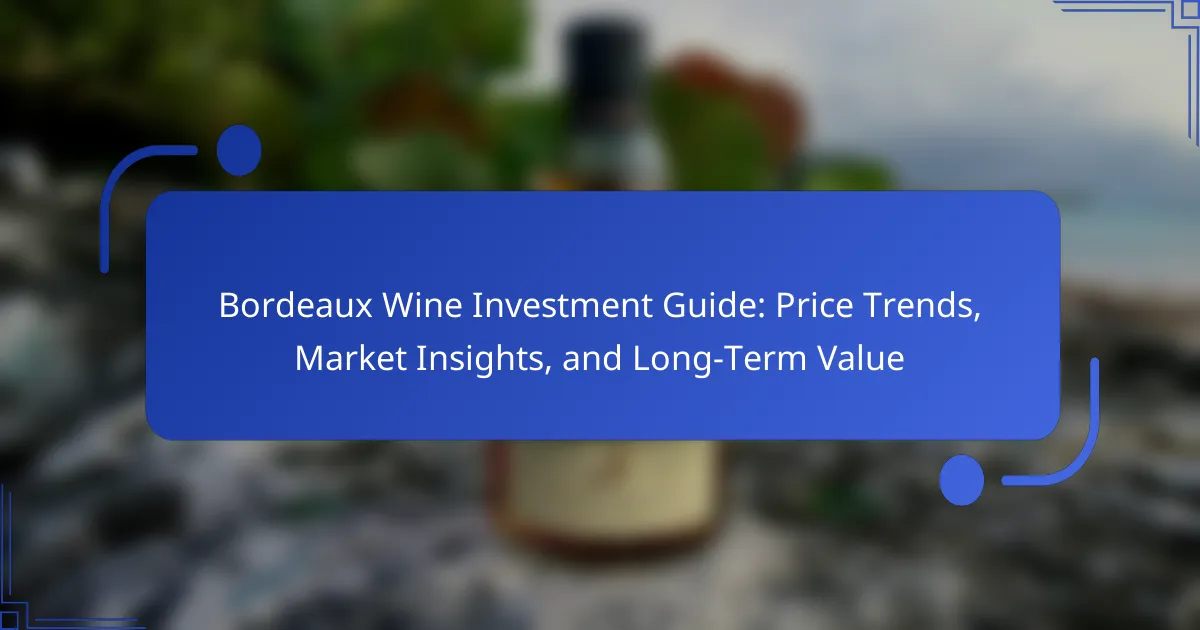
What is Bordeaux Wine Investment?
Bordeaux wine investment refers to the practice of purchasing Bordeaux wines with the expectation of future appreciation in value. Investors typically acquire fine wines from renowned Bordeaux châteaux. The investment potential is driven by factors such as vintage quality, scarcity, and market demand. Bordeaux wines have historically shown price growth, making them attractive for long-term investment. According to Liv-ex, the Bordeaux index has increased by over 200% over the last decade. This trend highlights the market’s resilience and the appeal of fine wine as an alternative asset class.
How does Bordeaux wine investment differ from other wine investments?
Bordeaux wine investment differs from other wine investments primarily due to its established reputation and market stability. Bordeaux wines are often produced in large quantities, leading to a more liquid market. They have a historical track record of appreciation, with many vintages showing consistent price growth over time. The Bordeaux classification system also adds a layer of prestige, influencing investor confidence. In contrast, other wine investments may lack such a structured framework, leading to higher volatility. Additionally, Bordeaux wines are often sought after by collectors and investors alike, driving demand. This demand contributes to their overall market resilience compared to lesser-known wine regions.
What are the key characteristics of Bordeaux wines that make them suitable for investment?
Bordeaux wines are suitable for investment due to their historical significance, quality, and market demand. They possess a long track record of price appreciation over time. Bordeaux wines, particularly those from classified growths, often have high ratings from wine critics. This acclaim increases their desirability among collectors and investors. The region’s strict regulations ensure consistent quality, further enhancing their investment appeal. Additionally, limited production of sought-after vintages creates scarcity, driving up prices. Bordeaux wines also benefit from a well-established global market, providing liquidity for investors. Overall, their combination of quality, reputation, and market dynamics makes them a solid investment choice.
What historical factors contribute to the investment appeal of Bordeaux wines?
Bordeaux wines have a strong investment appeal due to their historical significance and reputation. The region has been producing wine for over 2,000 years, establishing a long-standing tradition of quality. Bordeaux wines gained international recognition in the 18th century, particularly after the Treaty of Paris in 1763, which opened new markets. The classification of Bordeaux wines in 1855 further solidified their prestige, ranking wines based on quality. This classification has remained influential, driving demand for top-tier wines. Additionally, Bordeaux’s unique terroir contributes to the distinctiveness of its wines, enhancing their desirability. The historical trading routes through Bordeaux have also facilitated global distribution, increasing accessibility. Collectively, these factors have created a robust market for Bordeaux wines, making them attractive investments.
What are the potential benefits of investing in Bordeaux wine?
Investing in Bordeaux wine can yield significant financial benefits. Bordeaux wines have a historical track record of appreciating in value over time. According to Liv-ex, the Bordeaux 500 index has shown a 200% increase in value over the last decade. The global demand for fine wines, particularly Bordeaux, continues to rise, driven by emerging markets. Bordeaux wines are often considered a hedge against inflation, preserving wealth during economic downturns. Additionally, the rarity of certain vintages enhances their investment potential. Collectors and investors often seek out Bordeaux for its established reputation and quality. The wine market’s liquidity allows for relatively easy buying and selling of Bordeaux assets.
How can Bordeaux wine investments yield financial returns?
Bordeaux wine investments can yield financial returns through appreciation in value over time. The fine wine market has shown consistent growth, with Bordeaux wines often leading in price increases. According to the Liv-ex Fine Wine 100 index, Bordeaux wines have appreciated by an average of 10% annually over the past decade. Investors can benefit from the scarcity of top vintages, which drives demand and prices higher. Additionally, Bordeaux wines are often considered a hedge against inflation, maintaining value during economic downturns. The global wine market is expanding, with increasing interest from collectors and investors. This trend further supports potential financial returns from Bordeaux wine investments.
What are the tax advantages associated with Bordeaux wine investment?
Bordeaux wine investment offers several tax advantages. Investors may benefit from capital gains tax exemptions. In many jurisdictions, holding wine for over a year can reduce the tax rate on profits. Additionally, certain wine investments may qualify for tax reliefs, such as Business Property Relief in the UK. This relief can exempt the value of the wine from inheritance tax. Furthermore, wine is often considered a tangible asset, which can have favorable tax treatment compared to other investments. These tax benefits can enhance the overall returns on Bordeaux wine investments.

What are the current price trends in Bordeaux wine investment?
Current price trends in Bordeaux wine investment show a steady increase. The Bordeaux wine market has seen an average annual price growth of around 10% over the last five years. Fine wines from prestigious châteaux have consistently appreciated in value. For example, wines from Château Lafite Rothschild have increased by approximately 15% annually. The demand for Bordeaux wines remains strong, particularly in Asian markets. Recent auction results indicate that rare vintages fetch record prices. The Liv-ex Bordeaux 500 index reflects these trends, with significant gains noted in the last year. Overall, Bordeaux wine investment continues to be a lucrative opportunity for collectors and investors.
How have Bordeaux wine prices changed over the last decade?
Bordeaux wine prices have generally increased over the last decade. The average price of Bordeaux wines has risen by approximately 30% since 2013. This increase is attributed to growing global demand and limited supply. Notably, the fine wine market saw significant growth, with top-tier Bordeaux wines experiencing price surges of up to 50%. In 2020, the Bordeaux index reached a record high, reflecting strong investment interest. Additionally, factors like vintage quality and market trends have influenced price fluctuations. Overall, the trend indicates a robust appreciation in Bordeaux wine values over the past ten years.
What factors influence the price fluctuations of Bordeaux wines?
Price fluctuations of Bordeaux wines are influenced by supply and demand dynamics. The availability of specific vintages impacts pricing significantly. For instance, a reduced harvest due to adverse weather can decrease supply, raising prices. Conversely, an abundant harvest may lead to lower prices.
Market trends also play a crucial role. Increased interest from collectors and investors can drive prices up. Economic conditions, such as inflation or recession, affect consumer spending on luxury items, including fine wines.
The reputation of specific châteaux influences prices as well. Wines from renowned producers often command higher prices. Additionally, critical reviews and ratings can impact perceived value, leading to price changes based on consumer perception.
Lastly, currency fluctuations affect international buyers. A stronger currency can make Bordeaux wines more expensive for foreign purchasers, influencing demand and price.
Which Bordeaux wine brands have shown the most significant price appreciation?
Lafite Rothschild, Margaux, and Haut-Brion have shown the most significant price appreciation among Bordeaux wine brands. Lafite Rothschild has experienced price increases of over 200% in the past decade. Margaux has also seen substantial growth, with prices rising by approximately 150% during the same period. Haut-Brion, another prestigious brand, has appreciated by around 120%. These brands are consistently sought after in the fine wine market. Their historical significance and quality contribute to their increasing value. Market demand and limited availability further enhance their price appreciation.
What role does market demand play in Bordeaux wine pricing?
Market demand significantly influences Bordeaux wine pricing. When demand for Bordeaux wine increases, prices tend to rise due to scarcity. Conversely, if demand decreases, prices can drop. The Bordeaux wine market is characterized by a limited supply of high-quality vintages. This limited supply means that increased consumer interest can lead to higher valuations. Additionally, market demand is affected by factors such as global economic conditions and consumer trends. For instance, during economic booms, luxury goods, including fine wines, often see increased demand. Historical data shows that certain Bordeaux vintages have appreciated significantly when demand surged, reflecting the direct correlation between market interest and pricing.
How do global economic conditions affect Bordeaux wine demand?
Global economic conditions significantly influence Bordeaux wine demand. Economic growth increases disposable income, leading to higher wine consumption. Conversely, economic downturns result in reduced spending on luxury items like Bordeaux wines. For instance, during the 2008 financial crisis, Bordeaux wine sales dropped by 30% as consumers prioritized essential goods. Additionally, currency fluctuations can impact export prices and demand in international markets. A strong dollar may deter foreign buyers, while a weak dollar can boost exports. Overall, economic stability fosters confidence in wine investments, enhancing Bordeaux’s market appeal.
What trends are emerging in consumer preferences for Bordeaux wines?
Emerging trends in consumer preferences for Bordeaux wines include a shift towards sustainable and organic production. Consumers are increasingly valuing environmentally friendly practices. There is also a growing interest in lesser-known Bordeaux appellations. This trend reflects a desire for unique and diverse wine experiences. Additionally, younger consumers are favoring lighter, fruit-forward styles over traditional full-bodied wines. This shift is influencing producers to adapt their offerings. Furthermore, online wine sales are rising, driven by convenience and accessibility. This change is reshaping how consumers purchase Bordeaux wines.

What insights can be gained from the Bordeaux wine market?
The Bordeaux wine market offers insights into investment potential and price trends. Historical data shows that Bordeaux wines often appreciate in value over time. For instance, the Liv-ex Fine Wine 100 index indicates that Bordeaux wines have outperformed many other investment assets in the last decade. Additionally, market demand fluctuates based on vintage quality and global economic conditions. The 2016 vintage, for example, saw significant interest, leading to price increases. Understanding these trends can help investors make informed decisions. Furthermore, the Bordeaux market is characterized by a strong secondary market, with frequent auctions reflecting current valuations. This dynamic environment provides opportunities for both collectors and investors.
How can investors analyze Bordeaux wine market trends?
Investors can analyze Bordeaux wine market trends by examining historical price data, market reports, and auction results. Historical price data reveals past performance and price fluctuations of specific Bordeaux wines. Market reports from reputable sources provide insights into current demand and supply dynamics. Auction results highlight the selling prices of wines, indicating market value. Additionally, investors can track vintage ratings and expert reviews, which influence desirability. Monitoring global economic factors and consumer trends further aids in understanding market shifts. Collectively, these methods provide a comprehensive analysis of Bordeaux wine market trends.
What tools and resources are available for tracking Bordeaux wine prices?
Wine price tracking tools include websites and apps that specialize in wine market data. Notable resources are Wine-Searcher, Vivino, and Liv-ex. Wine-Searcher provides price comparisons from various retailers. Vivino offers user-generated ratings and price information. Liv-ex is a leading marketplace for fine wines, providing real-time pricing and market insights. Additionally, auction houses like Sotheby’s and Christie’s publish price results from their wine auctions. These resources help investors stay informed about Bordeaux wine price trends.
How do market reports and auctions inform investment decisions?
Market reports and auctions provide critical insights for making informed investment decisions in Bordeaux wine. Market reports analyze trends, pricing, and demand, helping investors understand market dynamics. They offer historical data on price fluctuations, indicating potential future performance. Auctions reflect real-time market value through competitive bidding, showcasing buyer interest and current valuations. Investors use auction results to gauge the desirability of specific vintages and producers. This data-driven approach allows for strategic planning and risk assessment in wine investments. By combining information from both sources, investors can make well-informed decisions that align with market conditions.
What are the risks associated with investing in Bordeaux wine?
Investing in Bordeaux wine carries several risks. Market volatility can lead to price fluctuations. Economic downturns may reduce demand for luxury goods like fine wine. The wine’s provenance and authenticity can be difficult to verify, leading to potential fraud. Storage conditions affect wine quality; poor storage can diminish value. Additionally, changes in consumer preferences may impact marketability. Regulatory changes can also affect wine investment. Historical data shows that fine wine markets can experience downturns, as seen during the 2008 financial crisis. These factors highlight the need for careful consideration before investing in Bordeaux wine.
What market factors can lead to a decline in Bordeaux wine values?
Economic downturns can lead to a decline in Bordeaux wine values. During recessions, consumers often reduce spending on luxury items, including fine wines. Oversupply in the market can also negatively impact prices. When production exceeds demand, values typically fall. Changes in consumer preferences can shift interest away from Bordeaux wines. This can result in lower demand and decreased prices. Additionally, fluctuations in currency exchange rates can affect international sales. A strong euro may make Bordeaux wines more expensive for foreign buyers, reducing sales. Lastly, negative publicity or scandals can harm the reputation of specific Bordeaux brands, leading to a decline in their market values.
How can investors mitigate risks in Bordeaux wine investments?
Investors can mitigate risks in Bordeaux wine investments by diversifying their portfolios. Diversification reduces exposure to any single investment. Investing in a range of Bordeaux wines can balance out potential losses. Researching market trends is crucial for informed decision-making. Historical price data shows that wines from top châteaux tend to appreciate over time. Utilizing reputable wine merchants ensures access to quality products. Engaging with wine investment funds can provide professional management and expertise. Regularly monitoring market conditions helps to identify optimal selling times. Proper storage conditions protect the wine’s quality and value.
What best practices should investors follow when investing in Bordeaux wine?
Investors should focus on quality, provenance, and market trends when investing in Bordeaux wine. Quality wines from reputable châteaux often appreciate in value. Provenance ensures the wine’s history and storage conditions are verified. Investors should also stay informed about market trends and vintage ratings. Notable vintages can significantly impact investment returns. Diversifying the portfolio with various producers and vintages can mitigate risks. Engaging with reputable wine merchants or auction houses can provide valuable insights. Finally, proper storage conditions are essential to maintain wine quality and value over time.
What strategies can enhance the long-term value of Bordeaux wine investments?
Investing in Bordeaux wine can be enhanced through careful selection, proper storage, and market timing. Selecting wines from reputable vintages and renowned châteaux ensures a strong foundation. Research indicates that wines from exceptional years tend to appreciate more significantly. Proper storage conditions, including temperature and humidity control, preserve wine quality and value. Market timing is crucial; selling during peak demand periods can maximize returns. Engaging with wine investment platforms provides market insights and trends. Regularly monitoring auction results helps gauge market performance. Diversifying investments across different vintages and producers mitigates risk. These strategies collectively contribute to enhancing the long-term value of Bordeaux wine investments.
How should investors approach storage and maintenance of Bordeaux wines?
Investors should store Bordeaux wines in a controlled environment. Ideal storage conditions include a temperature range of 50-55°F. Humidity levels should be maintained at around 70%. Wines should be kept away from direct sunlight and vibrations. Dark, stable locations are preferable for long-term aging. Bordeaux wines should be stored horizontally to keep the cork moist. Regularly monitoring conditions is essential for preserving wine quality. Proper storage can enhance the wine’s value over time.
Bordeaux wine investment involves purchasing fine Bordeaux wines with the expectation of future value appreciation, driven by factors such as vintage quality and market demand. This guide provides insights into the distinct characteristics that make Bordeaux wines suitable for investment, including their historical significance and market stability. Key trends in pricing, market dynamics, and the potential financial benefits of investing in Bordeaux wines are examined, alongside the risks and best practices for investors. Additionally, the article discusses current price trends, emerging consumer preferences, and strategies for enhancing the long-term value of Bordeaux wine investments.
